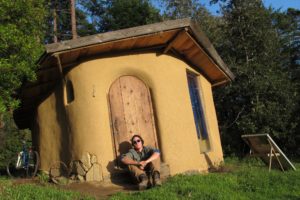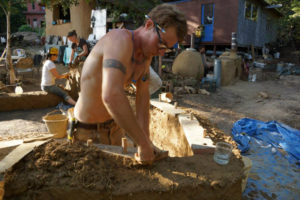159: Brandon Peterman on Natural Building
Constructing buildings and materials from locally sourced ingredients.
 Brandon grew up in Southern California and went to University of Southern California Riverside. Always feeling a connection to nature, he has been living on homesteads in the woods for the past four years and has been actively doing natural building for the past three years.
Brandon grew up in Southern California and went to University of Southern California Riverside. Always feeling a connection to nature, he has been living on homesteads in the woods for the past four years and has been actively doing natural building for the past three years.
He has participated in the building of over two dozen natural structures from cottages to bread ovens, garden walls, to covered benches and other homestead based structures.
His goal is to create a fully functioning working farm with a gardening education program and a year-round school program.
After his own apprenticeship, Brandon joined Kirk Mobert at the Sundog School of Natural Building which is based on 50 acres in Gualala, California. The school offers classes and on a rotating basis and apprenticeships in natural building.
In This Podcast: Greg gets to hear about a new topic on the podcast when he chats with Brandon who shares the basics about Natural Building. A life-long lover of the outdoors, Brandon tells how he found what he had been looking for in a building process that has been around for many centuries. This process is one that embodies several permaculture principles and has many time-tested examples existing around the world. Brandon tells about this method and the school that offers apprentice positions.
Listen in and learn about:
- Growing up in the suburbs of Los Angeles and wanting to live in the woods
- The goal he made for after college and why it got put on hold
- The moment that he realized he wanted to get back on his path
- Becoming an intern at Turtle Island Preserve in Boon, North Carolina
- Taking the impulse to get into Cob Building when he recognized that was what he wanted to do
- Getting a scholarship to the Sun Dog School of Natural Building and doing work trade for three months
- Getting from the East coast to the West coast when he only had $60 to his name
- His gratitude for the work ethic his parents instilled in him
- Natural Building – his definition is using locally sourced materials to construct safe and non-toxic human habitation
- Cob – clay rich soil, sand and straw mixed together with water
- Some examples of early cob building, several hundred to a thousand years old
- How the resurgence has come about
- The many different types of cob building materials and methods

- How repurposing different materials can be part of natural building
- Some of the places to get the materials for Cob that the Sun Dog School uses
- What is needed to make good cob if there is no straw or other materials available
- How building codes apply to the Cob Building process
- How cob survives through the weather
- More about Rocket stoves
- What a rocket stove is and how they work
- Why rocket stoves are more efficient for heating homes
- The apprentice program at the Sun Dog School
As well as:
- His biggest failure in natural building was learning the natural design process and realizing that he needed to start smaller
- The success of going through this program and how it has changed his life
- Why he thinks what he is doing is going to change the world, not through his own hands, but perhaps through the hands of those he teaches
- His advice to those who have an interest in natural building is to go and do it – he is giving you permission to try it
Brandon’s Book recommendations:
The Hand-Sculpted House: A Practical and Philosophical Guide to Building a Cob Cottage: The Real Goods Solar Living Book by Ianto Evans
Brandon’s Video recommendations:
Rocket Stove Forum – http://donkey32.proboards.com
How to reach Brandon:
Facebook: Sun Dog School of Natural Building
Facebook: Brandon Peterman
*Disclosure:
Some of the links in our podcast show notes and blog posts are affiliate links and if you go through them to make a purchase, we will earn a nominal commission at no cost to you. We offer links to items recommended by our podcast guests and guest writers as a service to our audience and these items are not selected because of the commission we receive from your purchases. We know the decision is yours, and whether you decide to buy something is completely up to you.




